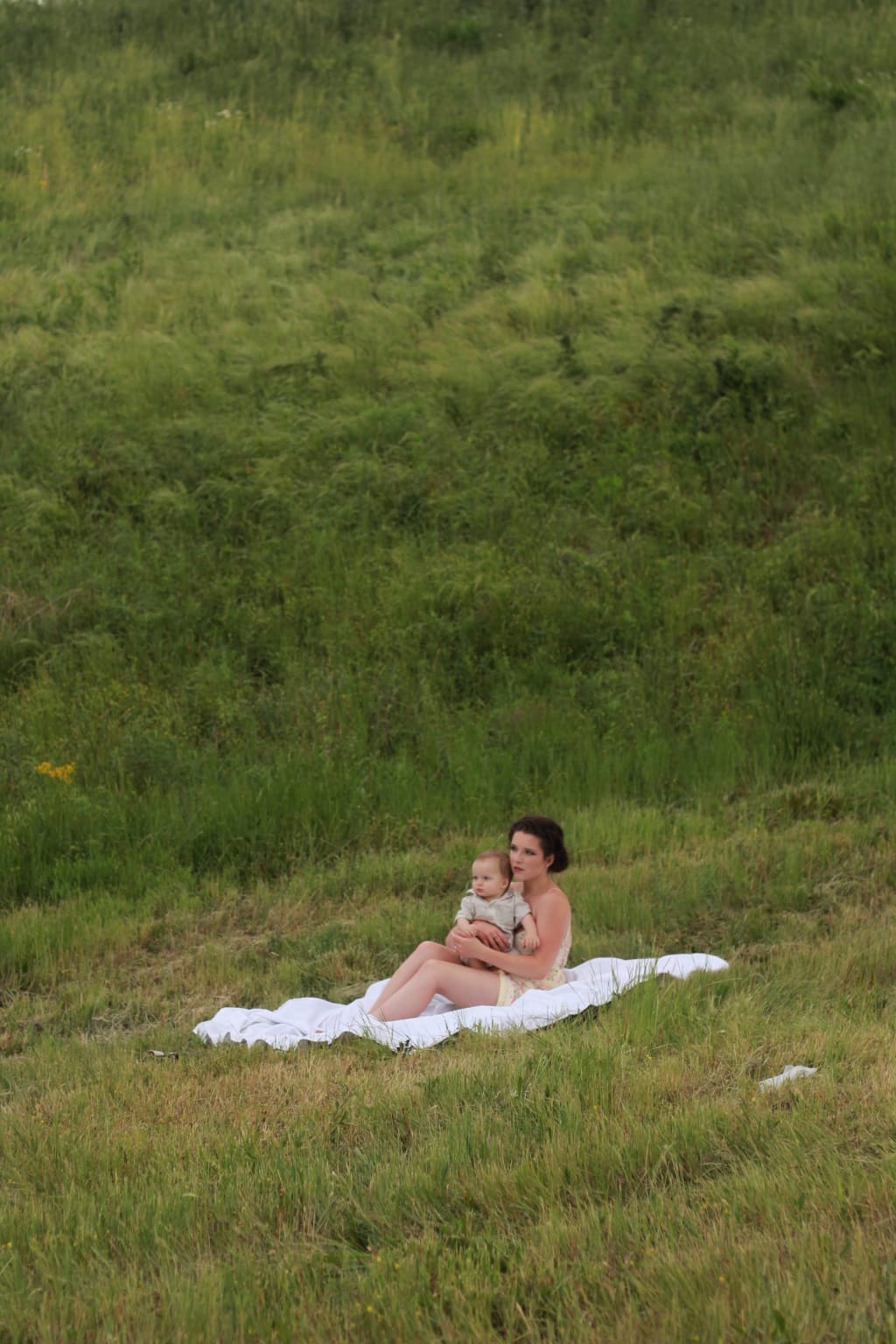The Murmurings of Angeli
My Dearest Rahas:

It’s evening here now, and as the sun nestles beneath the rumpled, blanket hills I write to you; lest I forget a detail of your coming. If I utter your story aloud, we are all endangered by it, and I can only imagine the guard would come to strip you from me.
I look at you and I see your shifting chest, just barely rising with the most meager of breaths. Your arms and legs like tree limbs could shoot clear across your cradle, but you have slept curled into yourself since your coming, like a dhole keeping warm. You don’t suck on your fingers; although they rest at your mouth. Your lips are drawn into the bittiest kiss, and they pump whilst you dream. Do you dream yet? You can hardly see. You couldn’t yet weigh as much as a dripping sari.
Yes, you are so small and vulnerable, but one day I know you will be fierce, filled with fortitude, and unbridled. I know this to be true because you have your father’s unplumbed almond eyes; and I have seen all those things in his as well.
This is the knowledge that so adamantly urges me to carry on.
I hardly realized the news of your father’s passing when it first came, as I rifled through a range of flamboyant ad papers and dense doctor’s notes. It was printed onto a spare emerald square, hardly the size of a contact card. You were almost half-term, then, and you pushed flush against my ribcage as I reread the note ceaselessly. I was gasping for breath that wasn’t there, as though all of the oxygen had been absorbed from the room.
You kept me safe all those following nights as I mourned, solaced only by your new, rhythmic kicks. Perhaps I wasn’t alone, as so many families were aggrieved by the war, but your father was the only person I had; which left me isolated to a degree I couldn’t fathom. It was the musical drumming and reaching of your tiny palms and toes that inhibited me from doing anything beyond what I had always done – survive.
The women of the village hardly spoke to me following your father’s death, yet I felt their stares. As I collected the water and did the laundering, you were my tenacity. I heard their whispers as I prepared our food for my tasteless mouth, and you were my persistence.
I will give you your father’s note one day; when you are older and need the companionship of a man like yourself. I only wish I had more to give you, but when your father was stationed, the country was in a state of emergency; so he threw his meager properties into a rucksack without the sentimentality of a man who might never meet his child.
The guard didn’t even return those things to us which he had possessed. Too many troops were passing, and too quickly; they hadn’t the time or the resources to make amends to the ravaged half-families in our land. Much less to the households as impoverished as our own.
The following trip to the hospital was the most difficult. The cruel, unrelenting July sun wove its slippery fingers into my scalp as I faltered, pitifully, down the asphalt path into the city. I remember watching the gentle waves dancing atop the road grow, expanding towards the edges of the horizon. They extended towards me, and there seemed to be only a second of blackness before I was happened upon by guard. They drug me into the back of their truck, which smelled of exhaust and military outfit, to accost me with a splash of frigid water across my face and accusatory words. I showed them the emerald card and informed them of you; and they laughed mockingly, elbowing each other jovially like children observing a circus act. I let them jest because I had heard of much worse things happening to women found walking alone. I grasped you and the card tightly in one hand, covering my face with the other; and could only think bitterly that war killed all the wrong soldiers.
The guard dropped me at the city limits, which is four achingly distant blocks from the hospital. As I shuffled, I clutched tight to the outer shadows of the buildings. The guard at the entrance of the clinic gauged me as though I was roadkill. He allowed me in, though.
I was directed towards an odorous consultation room. The blank-faced nurse commanded me to strip and sit on a stiff hygienic sheet for the examination. My gut lurched as she left, absorbing the shame of what it meant to be a widow; particularly one bearing child.
The doctor arrived minutes later, accompanied by a nameless, slick-headed agent I was informed represented the family resources department.
The agent told me in a most detached tone that because our family only had enough savings to account for three further weeks of medical care - even without ultrasounds - I couldn’t be permitted to carry or deliver you. Without your father affording his service to the country, we couldn’t ensure that our bills could be compensated. To continue to carry you was, as I was told, purely irresponsible.
They informed me then that because of your murmur, the state would also refuse to finance your adoption. One aberrant heartbeat for every three healthy ones meant that your life couldn’t be of priority. I was given two meager weeks to find a private venue for your care or schedule a removal process at the local clinic.
I had never walked so quickly before as I did then from the office, stricken at the notion I could lose everything I had ever loved so quickly.
Eleven days following my rushed departure I found myself in the market, looking perhaps for a miracle in a dusty lamp or the modern equivalent. Instead, I met the Khatri family. They were a private pair, but they seemed to take to us quite quickly. Naveena spotted you, barely extending from my natural stomach, and placed her hand upon you. Her desire was plain.
She asked of your father and glanced almost performatively around the stall before revealing the barest of smiles. I showed her the emerald note, and she covered her mouth, moving her palm to my shoulder. It was, possibly, all a fraud; and I suspect now she may have watched us weaving through the market for a good time before approaching.
Her husband was stern, exponentially older, and did not carry her vibrance; but he seemed to satisfy her and her him. Naveena revealed he owned several textile factories, which had struck financial abundance in an era where the government required millions of uniform furnishings. All the pair lacked was a full home – yet, at a time when the medical field was completely saturated by the demands of the militant regime, they had virtually no access to alternative conception methods.
I would’ve been a fool to deny them.
To protect the privacy of the family I was told I would reside and receive care strictly within the Khatri’s estate. I would deliver you there as well, and following their reception of a healthy child I would receive a compensation.
I was ushered into their home rapidly, which was laden in luxuries I hadn’t ever afforded thought to – fountains, courtyards, handmaids, and embellished décor to liven the long, arcing hallways of the home. I was given a spacious room and balcony with help of my own, who attended to our needs religiously. Our own abandoned home was never far from my mind, but it became easier to neglect with each day we were cosseted in the estate.
Naveena and I passed many days in the gardens together, musing her plans as a mother. I hadn’t anything of value to contribute to our chats, of course; I had never existed in a world quite like hers. When you live like you and I do, you can dream of those luxuries, of course … to experience them is altogether different. It’s as though you’re gliding, rather than walking, across earth. And to those like us, who are used to the labor and concentration of finding each meal, it is difficult to even conceptualize how to navigate the considerably more opportune world of fiscal immunity.
Despite our camaraderie, there was a rift between us; our envies of each other. I had that what she could never have, and she had it as well. Neither of us could’ve existed without the other, yet I often noticed her appraising my bump lustfully, as though she could rip you out and forget the part I played so easily. The more I grew, with you, the less she looked at me. Until you were two weeks from my arms and I was informed that Naveena was suddenly away, on holiday, until after I was scheduled to be induced.
The day that you were planned to arrive Naveena had not returned home. A midwife and two aids came to assemble the room, placing their tools and towels all within reach of the large birthing tub where I was going to have you. I looked at the pool and it seemed inviting – it was inviting – the water was tranquil and cool, and it soothed my contractions to a fair degree.
My labor lasted almost 22 hours.
And then the midwife announced that you were coming, my dear Rahas, but it wasn’t you – it was a tiny girl, hardly the length of my forearm. I wasn’t permitted to hold her. The aids pushed her away in an ornate, rolling crib. ‘Angeli’ was inscribed in gentle calligraphy along the nameplate; and as I read it, I shed the first tear of my labor.
The midwife then pressed hard against my abdomen, and I felt my body compress. A meager yelp escaped from me; my vision faltering even just for a moment.
The midwife gasped and I did also, as you slipped from me into her arms. I snatched you from her, thinking only of caressing your tender, innocent body in my arms. The midwife reached slowly for you, unobtrusively, patting your back as she had Angeli’s, coaxing you to breathe. Color flooded your body and face and I heard the gentle rasp of air flooding your lungs. You hardly had time to inhale before she pressed you to my chest, encouraging you to suckle, and you found refuge on my body in the pool.
Perhaps the midwife was a mother, or just a gentle soul. Most likely she was simply one of the miraculous pieces of your story who kept us together. She led me into the en-suite to bathe and clothe us both quietly, then paged the aids to tell them she would be escorting me, privately, to the hospital for further care.
My handmaid returned to lead us to a private exit, and she was characteristically silent as she walked. I saw her back stiffen as you made noise beneath my robes but she did not inquire. I remember musing that we were guided by angels.
The maiden helped to hoist me into the raised cabin, and as she did, she met my eyes for perhaps the first time.
And then her hands pushed something intricate and delicate into mine. I opened the contraption hours later as we rumbled down the path to our desert home, and it was then I saw the maid’s gift; a clump of Angeli’s soft, ebony locks curled within the jewelry. A piece of her always, because she couldn’t be mine.
You see the locket now, and it seems to suspend you in a trance. Your beautiful eyes are transfixed with the way it glimmers in the sunlight. I will give it to you one day, when you are older; and need the companionship of an angel to protect you. For now, you have me.






Comments
There are no comments for this story
Be the first to respond and start the conversation.